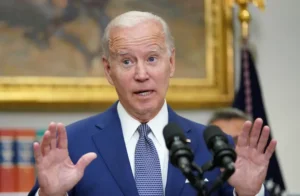Saudi Arabia has stopped short of formally recognizing Israel in the absence of a resolution to Palestinian statehood goals.

Israeli Finance Minister Avigdor Liberman said on Monday he hoped a regional visit by US President Joe Biden this week will lead to a common Middle East market that includes Saudi Arabia.
Biden arrives in Israel on Wednesday and continues to Saudi Arabia on Friday. The White House has said the visit’s aims include “expanding regional economic and security cooperation.”
Asked at an economic conference hosted by Calcalist newspaper what he expects to arise from Biden’s visit, Liberman said: “The creation of a new, common market in the Middle East. That’s the big challenge.”
“It will change the reality here from end to end, in both the fields of security and of economics. Therefore I hope the emphasis during Biden’s visit will be on creating this new market in the Middle East.”
Israel normalized relations with four Arab countries under a 2020 US diplomatic drive that received Riyadh’s blessing. But Saudi Arabia has stopped short of formally recognizing Israel in the absence of a resolution to Palestinian statehood goals.
“The creation of a new, common market in the Middle East. That’s the big challenge.”
Finance Minister Avigdor Liberman

In separate remarks to the conference, Israeli National Security Adviser Eyal Hulata said that within the framework of Biden’s visit “it is certainly possible to begin talking about the potential expansion of our markets in the region.”
Biden’s breakthroughs with Saudi Arabia
“It’s no coincidence that Biden is coming here on Wednesday and continuing on Friday from here to Saudi Arabia by direct flight,” Haluta added. “The ability to attend to these things carefully, step by step, can bring about breakthroughs.”
Liberman said his regional vision would include “a kind of trans-Middle East highway” and rail network linking up partner countries.
Turning to domestic matters, Liberman said that despite the rising cost of living and an inflation rate that has topped 4%, inflation in Israel still remains well below Western peers, while data show a strong economy with consumers continuing to spend locally and travel heavily abroad.

